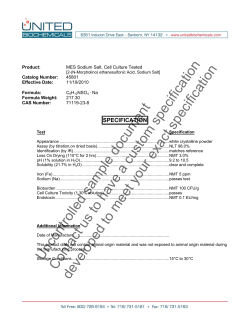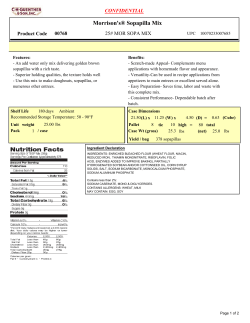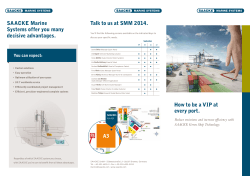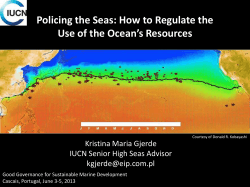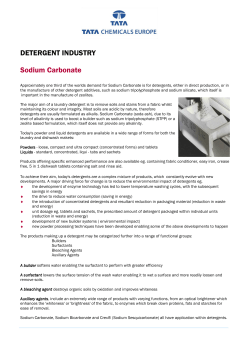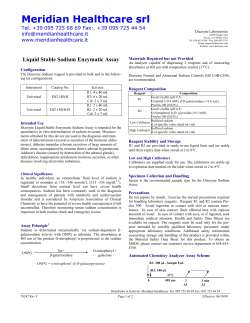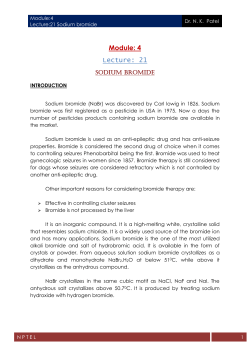
1 electrochlorination cells for seawater circuits Datasheet DS 015
electrochlorination cells for seawater circuits 1 Datasheet DS 015 Rev.00 Marine fouling Marine fouling is one of the major problems affecting virtually every structure involved in seawater treatment, transportation and usage. These includes sea water cooling circuits, desalination plants, and of course ship hulls and seawater circuits. Avoiding the formation of a stable biofilm is the key to fight marine fouling and its disastrous consequences. Chlorination water treatment One of the major techniques used with great success for industrial water treatment all over the world is chlorination. Marine fouling is the accumulation of microorganism, plants, algae and many varieties of animals (mussels, barnacles, tubeworm, etc...) and the consequent encrustation of the interested surfaces. Although marine fouling is a well-known problem, it is not as simple a process as it sounds: marine organism do not simply stick to the surfaces, but the whole process begins with the formation of a so-called “biofilm” Biofilm is a tiny layer of microorganisms embedded in a matrix of extracellular polymeric substances like proteins and polysaccharides. Biofilm starts growing on sea-wetted surfaces in a matter of minutes, and once formed, it serves as adhesion substrate and support for all those organisms responsible of the so-called “macrofouling”. This technique, known since the beginning of twentieth century, is a water treatment and disinfection process based on adding chlorine gas or hypochlorite to water. These compounds are strong oxidizing agents and act by oxidizing organic molecules. Chlorine compounds can easily disintegrate cell walls and deactivate proteins and enzymes. This kind of action makes these compounds extremely valid against a very wide range of bacteria and micro-organisms, making them powerful and extremely reliable antifouling agents. P.zza Matteotti, 2 int 9D • 16123 Genova • Italy +39.010.2477509 • industry@tecnoseal.it www.tecnosealindustry.com P.IVA 02256730991 electrochlorination cells for seawater circuits 2 Datasheet DS 015 Rev.00 Tecnoseal Industry S.r.l. propose a wide range of antifouling units based on electrochlorination, a process that produces sodium hypochlorite running a DC electrical current through seawater, without the need of any other added chemical. After use, sodium hypochlorite decomposes to benign products (salt and water), wasting no harmful substances in the environment. Our cells are based on the Hookes process, in which a solution of water (H2O) and sodium chloride (NaCl) is electrolyzed by a DC current. This results in chlorine gas (Cl2) being produced at the positive electrode (anode), while sodium hydroxide (NaOH) and hydrogen gas (H2) are produced at the negative electrode (cathode). The chlorine gas passes through the diluted NaOH solution and reacts forming hydrogen and sodium hypochlorite (NaOCl). The whole reaction can be simplified in the following formulas: NaCl+H_2 O+DC electricity= NaOCl+ H^2 Which is the same of: Saltwater+Energy= Sodium Hypochlorite Our electrochlorination cells for naval sea water circuits produce a solution of sodium hypochlorite in low concentration, a maximum of 0.5 ppm, which has proven to combine really strong antifouling properties, zero residual toxicity and do not induce any kind of corrosion in metallic piping. Our units use high quality MMO (Mixed Metal Oxide) Titanium anodes, entirely produced in Italy. These anodes consist in a substrate of Titanium that undergo a thermal oxidation process with rare-metals oxides that form a catalytic film on its surface. These metal oxides are selected for this specific applications and will ensure the best performances when compared to generic coating. MMO-Ti anode ensure superior reliability and lifetime, which can easily exceed 5 years in a proper-functioning system. P.zza Matteotti, 2 int 9D • 16123 Genova • Italy +39.010.2477509 • industry@tecnoseal.it www.tecnosealindustry.com P.IVA 02256730991 seawater electrochlorination cells for seawater circuits antifouling 3 Datasheet DS 015 Rev.00 Our products and services: Tecnoseal Industry can supply a wide range of electrochlorination cells and spare parts for electrochlorination systems, including: • Single, double and triple-type complete electrochlorination cells, suitable for direct replacement in electrochlorination systems • Electrochlorination cell’s spare parts including gaskets, isolators, internal spacers and whole anode assembly • Electrochlorination system components for direct replacement like valves, filters and pumps, insulating and corrosion resistant pipe fittings. For further information about our product range, our installation options, and to know if our components are suitable to replace your old units, please contact our sales office. P.zza Matteotti, 2 int 9D • 16123 Genova • Italy +39.010.2477509 • industry@tecnoseal.it www.tecnosealindustry.com P.IVA 02256730991
© Copyright 2025





